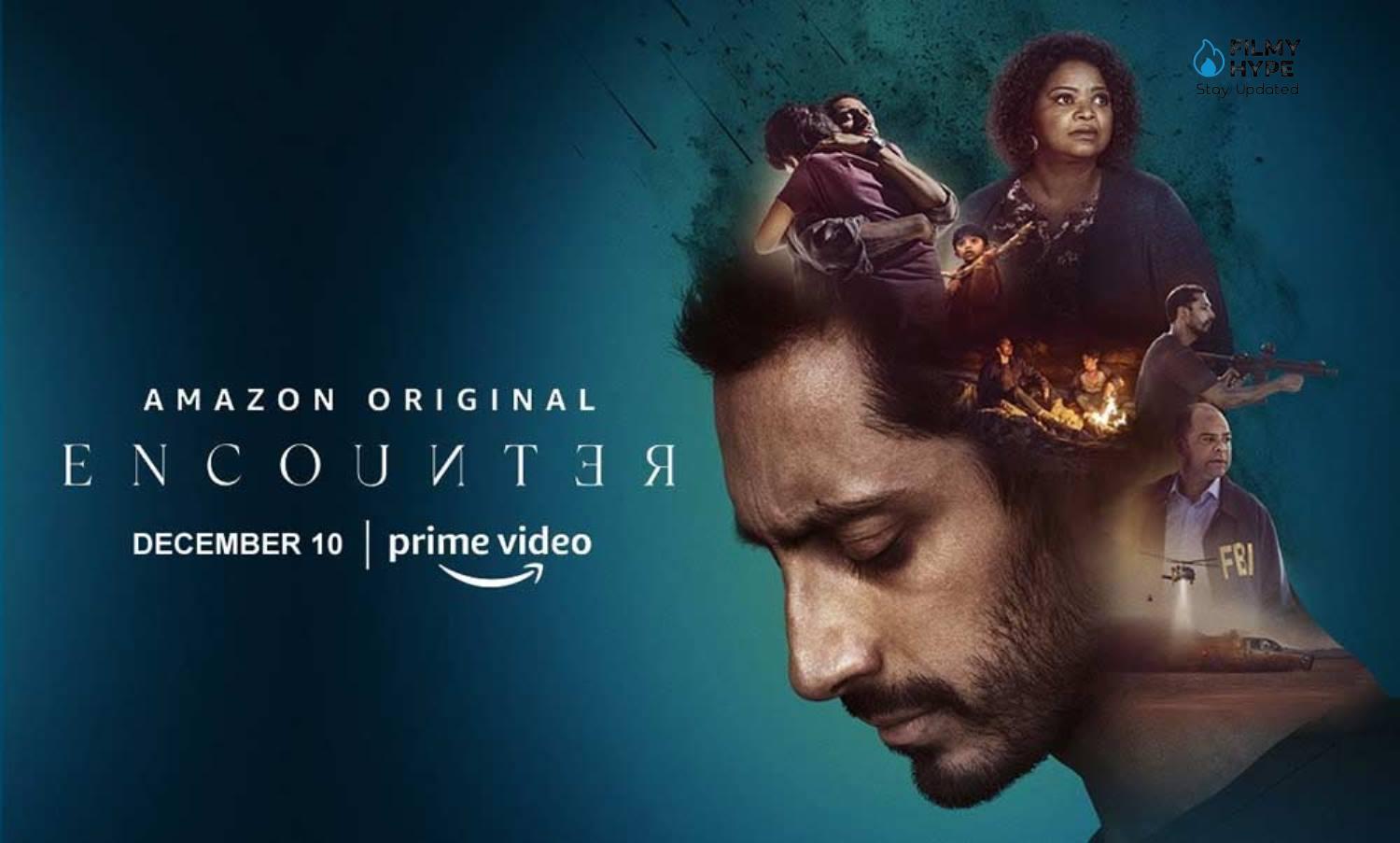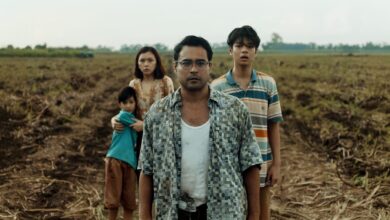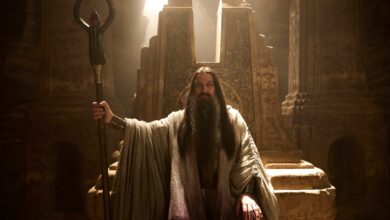Encounter Ending Explained: Madness Or Alien Invasion? The Ending Of Encounter And The Personal Story That Inspired It
The Amazon Original with Riz Ahmed is the second feature film by British director Michael Pearce, who retraces some real-life episodes from his childhood for this mix of science fiction and family drama.
Encounter the second feature film by Michael Pearce, the British director who won a BAFTA for his debut film, the romance mystery Beast is available exclusively on Amazon Prime Video from December 10th. Encounter too moves between different story levels: science fiction, family drama, psychological thriller, road movie. It is no coincidence that the screenplay was written by the director together with Joe Barton, the creator of Giri / Haji now hired by Netflix for Half-Bad (from the Sally Green fantasy trilogy), by HBO Max for the spin-off series of The Batman and by Paramount for the Cloverfield sequel.

Shot in the arid and “Martian” locations of Oregon, Nevada and California (Twentynine Palms, the Mojave Desert, Joshua Tree, the Owens Valley, Mammoth Mountain), Encounter ranges between genres but, in its essence, is the story of love of a troubled father for his children.
Encounter: The Plot
Malik Khan (Riz Ahmed) is a veteran of the Marines. He participated in about ten missions but was court-martialed for beating his captain: he broke his jaw into five pieces. Malik served two years in jail in Leavenworth, but “seems like a good guy”: at least that’s what Hattie (Octavia Spencer), his custodian, thinks of him. She is the only one convinced that Malik is not a concrete and dangerous threat.
Since returning “to the world”, Malik has been living an authentic obsession : he is convinced that an alien invasion is underway . A host of dangerous microorganisms, parasites spread on Earth by insects, are infiltrating people “inside”, controlling their minds from within. It is to protect and save them that the former marine joins his two sons, Jay (Lucian-River Chauhan) and Bobby (Aditya Geddada), who now live with his ex-wife Piya (Janina Gavankar) and his son in the middle of the night. new mate Dylan (Misha Collins).
The three set off on a journey, but what at first glance appears to the eyes of the children as an extraordinary adventure with that strong and special father, soon turns into a tight manhunt. On the trail of Khan, accused of kidnapping his boys, there is in fact an FBI team led by agent Shep West (Rory Cochrane).
Encounter Ending Explained
From the very first stages of the journey, it becomes evident that Malik’s end-of-the-world visions are the fruit of his mind. Man lives in a precarious psychic condition. He is a victim of PTSD: like many veterans, he suffers from PTSD. He has nightmares, outbursts and nervous breakdowns. He could not stand what he experienced in the Middle East: during the last mission it was 48 degrees, he saw two comrades finished to pieces and children in the debris, while the insects ate them alive. The stress level was unimaginable and Malik paid the consequences on his own skin.
Malik, Jay and Bobby encounter several problems en route to their destination, Lake Gromm base camp: a racist cop, an elderly man who doesn’t hesitate to hit Malik with a shotgun when he finds out he’s trying to steal his car, his sons – members of the Three Percenters militia, a radical conservative far-right movement – who want revenge with blood. These violent “signals” make their children, especially Jay, understand that their dad’s mental health is at great risk.
They would never have imagined being kidnapped by their father, ready for anything, even leaving his mother and Dylan gagged and tied up in their garage. Jay and Bobby love Malik, but it’s the first time they’ve seen him in years and he’s become like a stranger around this time. Initially they believe in the alien threat, and so they explain why the mother, actually pregnant, vomits very often, especially in the morning, and eats “strange things” like chocolate and mayonnaise and ricotta and onions.
Despite what FBI profilers think, Malik is not a so-called “family annihilator”. He doesn’t want to hurt his children and then himself, he thinks he’s on a mission to save them. He suffers from an undiagnosed psychotic disorder, a borderline personality bordering on schizophrenia. He is convinced that the invasion is underway and protects himself with the insecticide he sprays on himself. His paranoia is fueled by the menacing glances of others: the “aliens” are those who regard him as a stranger because he is “Arab” and make him feel like an unwanted guest, even though he has served his homeland with honor.
The breaking point for Malik is the discovery that Piya is pregnant and the meeting with Dwight and Kurt, the children of the old man who hit with a lamp. After a violent firefight, the former marine neutralizes the two without killing them and lets the police track him down. He stops at a diner with Jay and Bobby and calls his ex-wife. The children are safe, she tells them Mom and Dylan are healed and they can’t wait to see them, someone will be picking them up soon. The bad news is that he has to “keep fighting”. But when he gets back in the car, Malik discovers that Jay is hiding in the car: he doesn’t want to leave him alone. It’s not Bobby who needs treatment. Now is the time to take care of each other.
Jay is much more mature than his 10 years. He understood that his father is struggling with mental disorders and kidnapping them made his life difficult. “I didn’t take care of you. I put you in danger. You trusted me, and I lied to you. And look how it ended,” Malik tells him. Hattie was right: Hunted by a massive group of officers ready to fire, Malik chooses to live for his children. Also because Jay promised it: he won’t leave without him. Nobody saves himself alone. What could have been a dramatic showdown ends in a moving hug.
The True Story Of Michael Pearce
Obviously Encounter is not based on real events. Behind Jay’s story, however, is a lot of Michael Pearce’s background. During an interview with Deadline the director revealed that he “identified” with the relationship between Malik and his two children.
When he was around the age of the boys in the film, his mother died of a brain tumor and his father found himself having to raise himself and his brother. They didn’t know it at the time, but Dad was depressed from all that pain. In addition to grief, he had also lost his job.
For most of my childhood, I grew up with a single father who had been in the military and a younger brother, very much like Bobby. For this reason, I knew the dynamics between the characters well and I saw myself in them, understanding the journey they face. When my brother and I were the same age as Jay and Bobby, we went through a deep crisis, a series of crises, and we had to go through them like a real family.
Speaking with PopMatters , Pearce explained that Encounter “is not an autobiography” . Rather, it is a deepening of “emotional nuances” that he knows very well: the “explosive quarrels” and the “tender reconciliations” of the family, the competition between the two brothers to attract the attention of the father.
In his hands, Encounter has become a study of “warmth, connection and forgiveness”. There are several lines in the script that are taken literally from his childhood.
It wasn’t easy, but it brought us together in unexpected ways. The way we got through that crisis was to show compassion for each other, and when I look back now, I think we were helping my dad get through a lot of those things just as much as he was helping us. I approached this story in this way because I understood that dynamic.
It was at Jay’s age that Pearce, who grew up in a family lacking “a hierarchical structure or a sense of patriarchal authority,” began to realize that his father was not the perfect, unbeatable man he imagined: he too needed. of help . When, a long time later, he read Joe Barton’s script, around for at least ten years looking for a director, it seemed “natural” to face a film that would stage that phase of life in which one finds oneself growing up. becoming “peers” (and often parents) of their parents, now “fragile and vulnerable”.
In the original script, Malik was called Marcus and he was white. He was a classic “American hero”, a complicated anti-hero but still a “white savior”. With the casting of Riz Ahmed, a British of Pakistani descent and a Muslim, everything changed and a further layer of complexity was added to the story of the film. In an interview with Vanity Fair the actor calls it “that racial alienation that any war veteran with Malik’s background would have back home”. Ahmed changed the accent (from English to American),
The director and actor envisioned Malik’s upbringing, why he joined the Marines and what motivated him. His vulnerability has ancient roots: he grew up in foster care, didn’t always have a loving family behind him, and suffered traumatic events in his childhood. When he grew up, Pearce tells PopMatters, “he wanted to be the person he needed when he was a kid.” A protector, a warrior who never received the help and care he needed in decisive moments. Encounter also aims at this: to change the way in which mental distress, “gun violence” and the fallibility of the male world are represented.





